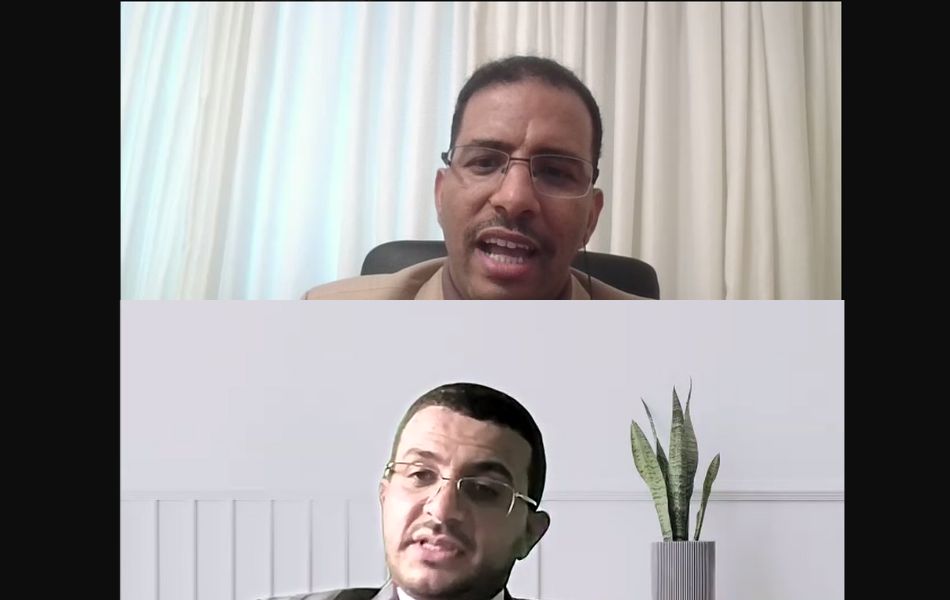
Geneva – SAM Organization for Rights and Liberties and the Abductees’ Mothers Association, a member of the Yemen Justice Charter Alliance, held a high-level seminar titled “Transitional Justice Approaches in Yemen: Tribal Customs and Legal Context.” The seminar was organized under the framework of the SPARK Project, supported by the DT Institute, and brought together a distinguished group of experts and stakeholders.
The event was opened by journalist Shorouq Al-Qasimi, who underscored the importance of raising community awareness about transitional justice. She emphasized that the seminar is part of a broader series of national dialogues aimed at promoting community engagement and integrating diverse legal and social perspectives into transitional justice frameworks.
Tawfiq Al-Humaidi, President of the SAM Organization, stated that this seminar is part of an ongoing webinar series jointly organized with the Abductees’ Mothers Association in cooperation with the DT Institute. He asserted that transitional justice is no longer a theoretical ideal, but a national imperative to prevent the recurrence of past atrocities and to build a safer future. He stressed the importance of addressing gender issues and reconciliation from the victims’ perspective and involving all segments of society in constructing justice mechanisms, especially in light of Yemen’s complex challenges.
Judge Mohammed Hamoud Al-Hitar, an expert in transitional justice and human rights, emphasized that transitional justice is a historical necessity that extends beyond trials to include truth-seeking, reparations, and institutional reform. He noted that efforts began in earnest during the 2011 revolution and took clearer form during the National Dialogue Conference. However, progress stalled after the 2014 coup due to the absence of a regulatory law and unified legislation.
Judge Al-Hitar addressed the bifurcation of the judiciary, with parallel legal systems operating in Sana’a and Aden without mutual recognition, which has severely undermined public trust in judicial institutions. He criticized the Houthi interference in judicial independence through the creation of the “Judicial Apparatus” and unconstitutional amendments that grant extensive powers to their political council leader.
Al-Hitar highlighted the fragile public trust and the urgent need for independent accountability mechanisms. He called for a national transitional justice project that redefines political legitimacy based on citizenship, ensures meaningful participation of victims, and includes civil society. He stressed that this effort must be rooted in broad political consensus, genuine judicial reform, and societal engagement, rather than dictated by dominant political actors. Drawing on international experiences, he argued that justice must include social and symbolic dimensions to restore trust and promote reconciliation.
Dr. Adel Dashela delivered a comprehensive presentation on the role of tribal customs in supporting transitional justice. He noted that Yemen’s tribal, agrarian society has its own distinct culture, which must be acknowledged in any justice framework. The primary challenge, he observed, lies in the intentions of conflicting parties: perpetrators often seek to evade accountability, while victims may seek revenge—complicating the justice process.
He called for the documentation of tribal customs and their integration into a legal framework that supports transitional justice efforts, particularly in light of widespread distrust in the formal judiciary. However, he cautioned against the limitations of tribal systems, especially in addressing women’s issues and sensitive social matters, advocating instead for a national strategy that respects both community values and religious-cultural specificities.
Dasheela also examined global experiences in countries such as South Africa, Chile, and Rwanda, noting their partial successes in addressing justice issues. He argued that Yemen requires reparative mechanisms, including financial compensation and access to essential services such as healthcare and education for victims.
Dr. Dasheela stressed that tribal customs are dynamic and prioritize the rights of victims rather than victors. He cited an example from Hadhrami tradition—“Hadd al-maal al-irjaa’ wala bara’ah fi arsh wala naqa’ fi ‘ird”—which mandates the return of property, compensation for harm, and zero tolerance for violations of personal honor. He also referenced real-life cases of tribal protection extended to political figures from Islah and GPC parties in Houthi-controlled areas, highlighting the tribes’ role in maintaining civil peace in the absence of state authority.
Dr. Dasheela addressed the challenges of dealing with sexual violence and honor-related cases in a conservative society. “Some victims cannot speak out due to fear of social stigma, despite having every right to justice,” he said. He urged the documentation and legal incorporation of tribal customs to support reparations and justice efforts.
In response to audience questions, Judge Al-Hitar emphasized the need for civil society to document violations, preserving the voices of victims and preventing justice from becoming a tool for retribution. Dr. Dasheela argued against the “forgive and forget” mentality, which enables repeated violations. He reiterated the importance of tribal customs in preserving rights and dignity, citing Hadhrami traditions as a foundational reference.
Both speakers called for the establishment of a comprehensive national archive to document violations as a cornerstone for future reconciliation. Dr. Dasheela noted that true change requires not only new political actors, but also political will and community commitment to principles of truth, fairness, and reconciliation. He warned that continued political self-interest risks externally imposed solutions that could fragment Yemen along sectarian or regional lines.
Judge Al-Hitar stressed that justice must be impartial and that civil society has a duty to document violations committed by all parties without bias. Dr. Dasheela reiterated the need for a unified national archive and cautioned against repeating the historical mistakes of the political elite, who have prioritized personal interests over the public good since the 1970s.
Participants agreed that sustainable peace in Yemen cannot be achieved without comprehensive transitional justice that ensures truth-telling, reparations—both moral and material—and the rebuilding of institutions on a constitutional and socially just foundation. They called for transitional justice to become a unifying national project that transcends political divisions and includes all Yemenis in the process of reconciliation and nation-building.
The seminar concluded with a call to continue and expand such dialogues to incorporate the voices of victims, civil society, and key stakeholders, thereby contributing to a Yemeni transitional justice process that addresses the past and safeguards the country’s future.